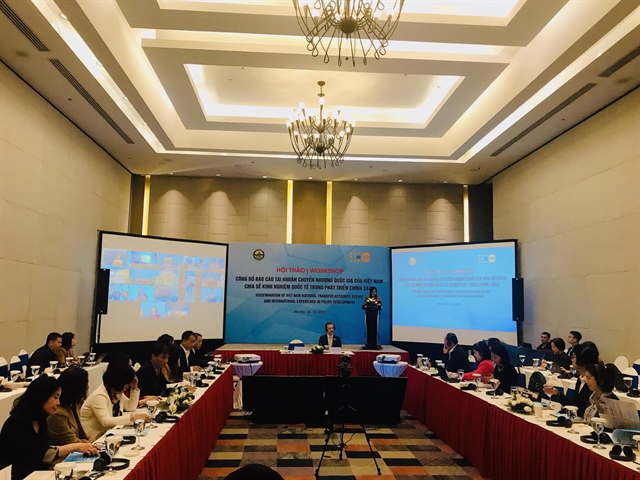 Society
Society

 |
| An overview of the conference. — VNS Photo Thu Trang |
HÀ NỘI — The Việt Nam National Transfer Accounts (NTA) report was declared in Hà Nội on Wednesday by the General Statistics Office of Việt Nam (GSO) and the United Nations Population Fund (UNFPA).
The NTA report was completed under a development cooperation project between the GSO and the UNFPA with the technical support of Professor Sang-Hyop Lee from the University of Hawaii, an international expert and project leader on NTA in Asia.
Speaking at the workshop, Nguyễn Thị Hương, General Director of the GSO, said: "The NTA is a comprehensive and systematic method used to describe the economy in detail through the economic life cycle and the reallocation of economic resources between generations.”
“This approach helps countries improve their understanding of the generational economy and how generations influence economic growth,” she said.
Research on NTA has been conducted and published in more than 70 countries worldwide.
“This method not only proves its superiority in analysing economic indicators through the population but also allows answering many important macro policy questions in which population is the centre,” said Hương.
Matt Jackson, UNFPA Representative in Việt Nam, said that by 2050, the proportion of persons aged 60 and above in the Asia-Pacific region is projected to increase from about 14 per cent last year to nearly 26 per cent.
The proportion of children under 14 will move in the opposite direction, decreasing from 23 per cent to 17 per cent.
“This shift from a young to an aged society has multifaceted consequences at national, regional and global levels,” he said.
The population pyramid 2019 in Việt Nam shows that the country is currently in the demographic window of opportunity. It has the advantage of tapping the demographic dividend. This is projected to end by 2039.
Việt Nam is one of the most rapidly ageing countries in the region and worldwide. The country's transition from population ageing to ageing population will be much shorter than many other countries.
Experience from other countries shows that population policies are often underrated in terms of their importance, resulting in numerous demographic consequences that can negatively impact the socio-economic development of nations. Prioritising investment in these areas not only benefits societies and communities, but also avoids the additional costs of addressing related challenges later on.
“Therefore, additional investment in research for National Transfer Accounts to generate evidence on the economics of population ageing is needed. It helps develop policies and interventions that prepare for an ageing population,” he said.
Việt Nam’s NTA report indicates that the country has moved from the first demographic dividend, mainly based on a working population that is double that of the non-working population, to a second demographic dividend which focuses on increasing labour productivity, investing in human resources, in particular, supporting women in the labour force and developing policies to increase participation in the labour force.
“To achieve this, Việt Nam needs to allocate resources to invest in health systems and education,” said Matt.
 |
| Nguyễn Thị Hương, Director of the General Statistics Office of Việt Nam, gives a speech at the conference. — Photo courtesy of the UNFPA |
The GSO announced several essential findings from the NTA research results at the conference.
They show that populations of different ages will have other characteristics and income and consumption levels. Children and the elderly often spend more than they earn, with children likely spending more on education, while the elderly may be spending more on health care.
People in adulthood often work and generate more income than they spend, but the structure of income and spending between adult ages is also very different.
Based on the research results, the GSO recommends several important policy suggestions. It affirms that, although from the perspective of the NTA, Việt Nam is still in the golden population structure period with an abundant young labour force, it is forecast that this period will last at least ten more years.
Therefore, policies to take advantage of the period, especially ones to create decent jobs for workers, remain valid and need to continue to be implemented to ensure sustainable growth. — VNS




